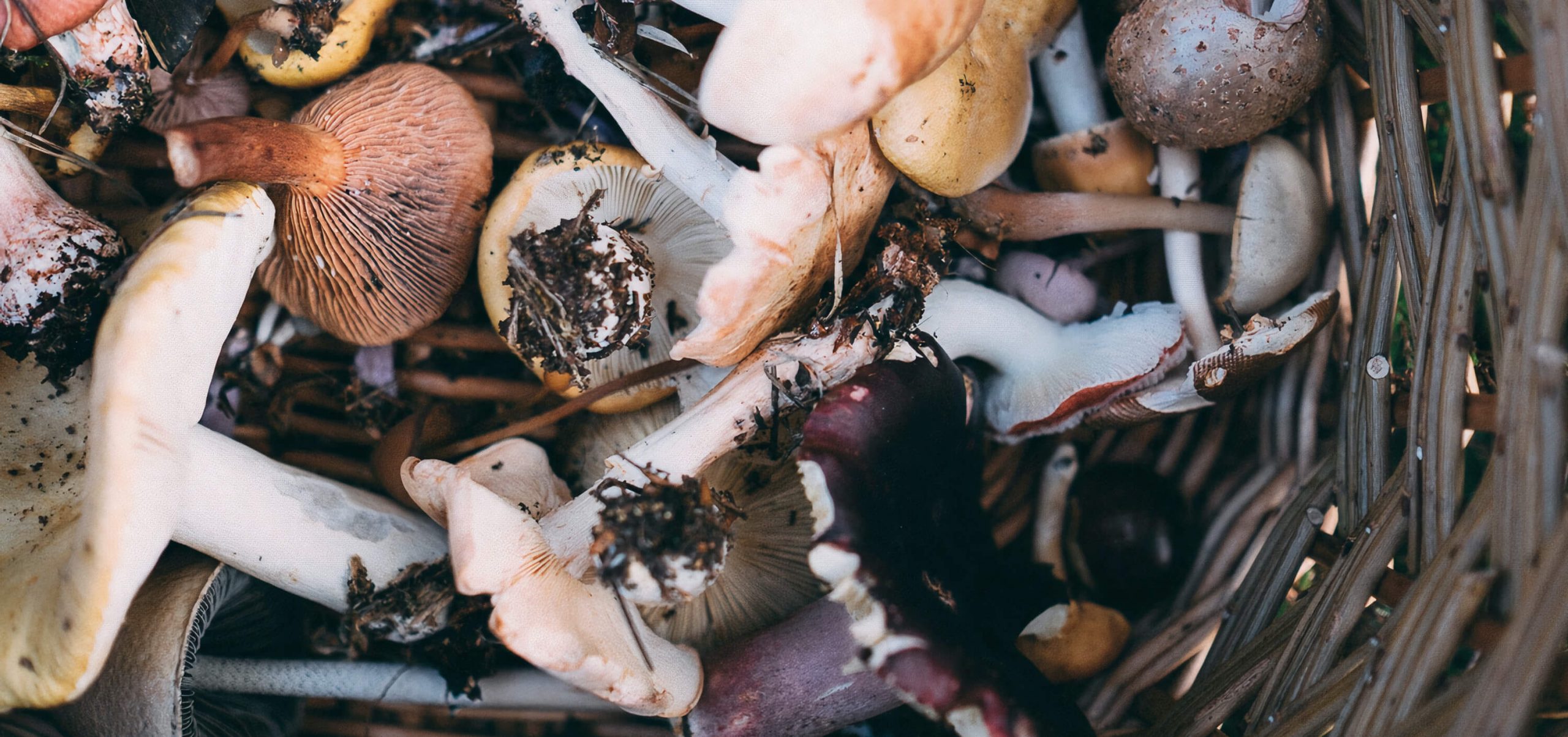
Good to know:
Traditional Chinese medicine and natural cosmetics
Good to know:
Traditional Chinese medicine and natural cosmetics
Reishi & Tinder fungus: Traditional Chinese Medicine (TCM) and science
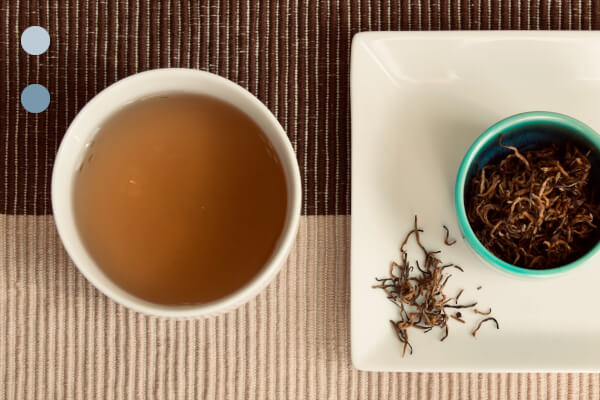
Mushrooms have been used in traditional Chinese medicine for thousands of years to treat and heal a wide variety of diseases. They are also successfully used for wounds, inflammations and eczema.
The Far Eastern beauty industry has already discovered the positive properties of vital mushrooms such as reishi and tinder fungus on the skin. It uses the mushrooms in numerous creams to beautify the skin – and beyond, for example in hair products.

Reishi & Tinder fungus: Traditional Chinese Medicine (TCM) and science

Mushrooms have been used in traditional Chinese medicine for thousands of years to treat and heal a wide variety of diseases. They are also successfully used for wounds, inflammations and eczema.
The Far Eastern beauty industry has already discovered the positive properties of vital mushrooms such as reishi and tinder fungus on the skin. It uses the mushrooms in numerous creams to beautify the skin – and beyond, for example in hair products.
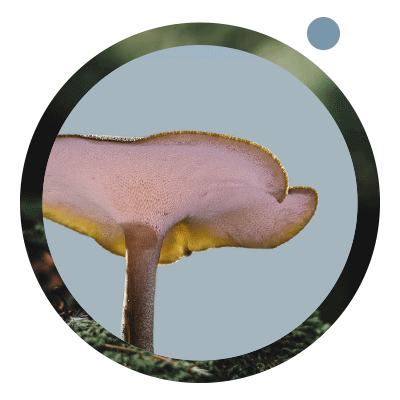
Reishi: The mushroom of immortality
Reishi has already been used in early traditional Chinese medicine to improve health and well-being. The vital mushroom is known for its skin-protecting and strengthening effect.
Not only through its anti-oxidant, anti-inflammatory and anti-allergenic properties, but also through its immune-stimulating qualities, Reishi can reduce skin irritation and reddening. Therefore, it is especially popular for use on sensitive skin.
Tinder fungus: Well-tried wound healing mushroom
It is not for nothing that tinder fungus has always been used to treat wounds: the vital mushroom has hemostatic, disinfectant, anti-inflammatory and wound-healing properties.
Its antibacterial, antiviral and immune-strengthening qualities also make it an effective agent in the field of wound healing.
Especially with particularly sensitive and irritated skin, the vital mushroom can have a calming effect and contribute to a reduction of skin reddening and irritation.
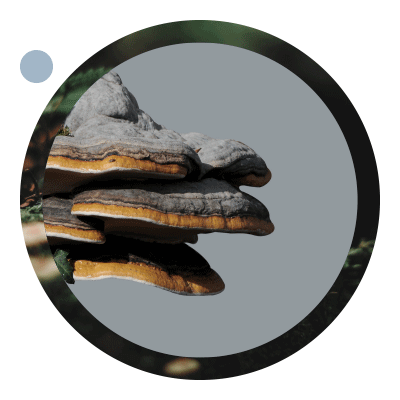
Today, with modern research, we can investigate where the healing abilities of the two vital mushrooms come from. In the case of reishi and tinder fungus, scientifically speaking, it is their special active components that influence the skin in a variety of ways:
Beta-glucans are known for their wound-healing, anti-inflammatory and immune-stimulating properties.
Ganoderic acids & triterpenes are well-regarded anti-allergenic agents that have been shown in studies to have anti-inflammatory and wound-healing abilities.
Phenolic and polyphenolic compounds are excellent antioxidants. They scavenge free radicals and protect DNA from damage.
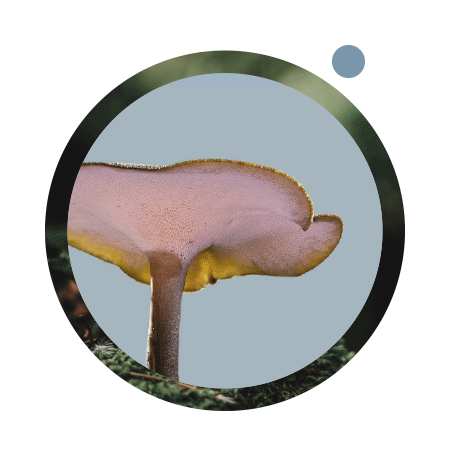
Reishi: The mushroom of immortality
Reishi has already been used in early traditional Chinese medicine to improve health and well-being. The vital mushroom is known for its skin-protecting and strengthening effect.
Not only through its anti-oxidant, anti-inflammatory and anti-allergenic properties, but also through its immune-stimulating qualities, Reishi can reduce skin irritation and reddening. Therefore, it is especially popular for use on sensitive skin.
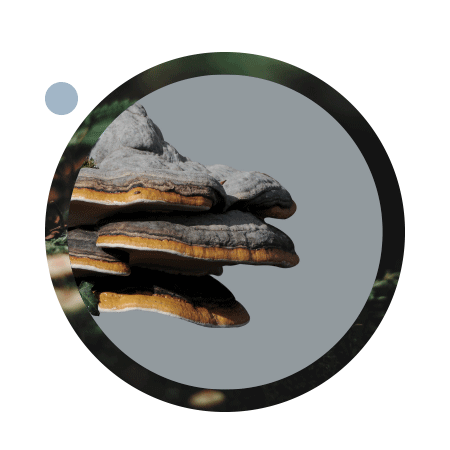
Tinder fungus: Well-tried wound healing mushroom
It is not for nothing that tinder fungus has always been used to treat wounds: the vital mushroom has hemostatic, disinfectant, anti-inflammatory and wound-healing properties.
Its antibacterial, antiviral and immune-strengthening qualities also make it an effective agent in the field of wound healing.
Especially with particularly sensitive and irritated skin, the vital mushroom can have a calming effect and contribute to a reduction of skin reddening and irritation.

Today, with modern research, we can investigate where the healing abilities of the two vital mushrooms come from. In the case of reishi and tinder fungus, scientifically speaking, it is their special active components that influence the skin in a variety of ways:
Beta-glucans are known for their wound-healing, anti-inflammatory and immune-stimulating properties.
Ganoderic acids & triterpenes are well-regarded anti-allergenic agents that have been shown in studies to have anti-inflammatory and wound-healing abilities.
Phenolic and polyphenolic compounds are excellent antioxidants. They scavenge free radicals and protect DNA from damage.
Medicinal mushrooms: Best in organic quality
To get the best possible benefit from ingredients such as reishi and tinder fungus, the quality must be right from the start. Farms like the Austrian organic farmer "Tyroler Glückspilze®" cultivate a wide variety of unadulterated vital mushrooms for this purpose.
After harvest, the mushrooms can be used to produce high-quality organic extracts for food, medicine and agriculture – and also for use in creams specially developed for dry, chapped and irritated skin.

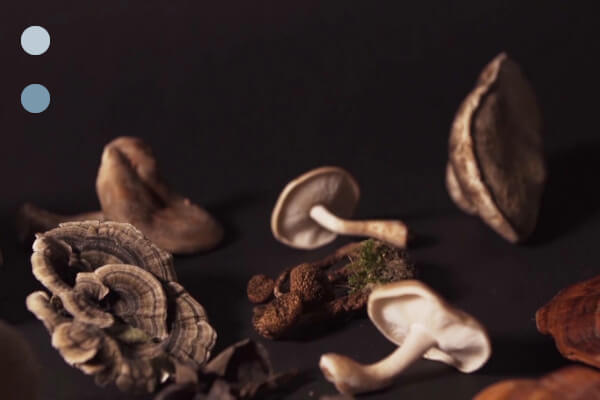
Medicinal mushrooms: Best in organic quality

To get the best possible benefit from ingredients such as reishi and tinder fungus, the quality must be right from the start. Farms like the Austrian organic farmer "Tyroler Glückspilze®" cultivate a wide variety of unadulterated vital mushrooms for this purpose.
After harvest, the mushrooms can be used to produce high-quality organic extracts for food, medicine and agriculture – and also for use in creams specially developed for dry, chapped and irritated skin.


Natural ingredients for stressed hands
The skin on the hands in particular is currently under greater strain than ever. It not only has to cope with the usual weather conditions and environmental influences, but also with more frequent hand washing and the use of disinfectants.
Natural ingredients such as the vital mushrooms reishi and tinder fungus are doubly useful for already irritated skin. For one, the natural properties of the mushrooms can soothe the hands and help regenerate the skin barrier. For another, synthetic fragrances and other additives, in contrast, can additionally damage the skin, even though it needs especially gentle care in this particular state.
Natural ingredients for stressed hands

The skin on the hands in particular is currently under greater strain than ever. It not only has to cope with the usual weather conditions and environmental influences, but also with more frequent hand washing and the use of disinfectants.
Natural ingredients such as the vital mushrooms reishi and tinder fungus are doubly useful for already irritated skin. For one, the natural properties of the mushrooms can soothe the hands and help regenerate the skin barrier.
For another, synthetic fragrances and other additives, in contrast, can additionally damage the skin, even though it needs especially gentle care in this particular state.
Natural cosmetics: Sustainability instead of artificial short-term effects
Natural cosmetics use ingredients that are not only more natural than the ones in conventional products: They are at the same time kinder to people and to the environment. As a rule, natural cosmetics therefore do not contain synthetic fragrances, parabens, certain emollients (such as propylene glycol), silicones and PEGs.
In addition, many ingredients are plant-based, in some cases also animal-based or mineral-based, which is why the most important components of natural cosmetics are oils and fats, but, depending on the consistency, also waxes.


Dry skin in particular can benefit from this. While artificially manufactured materials such as silicone produce a short-term effect, they are also quickly washed off again. This means they also end up in the environment via wastewater, where they are difficult to break down – unlike vegetable oils, which are biodegradable. Oils and fats also provide lasting moisture and can strengthen the skin from the inside out.
Less is therefore often more here: When choosing hand care, opting for natural and sustainable cosmetics not only supports the skin, but also our earth.
Natural cosmetics: Sustainability
instead of artificial short-term effects
Natural cosmetics use ingredients that are not only more natural than the ones in conventional products: They are at the same time kinder to people and to the environment. As a rule, natural cosmetics therefore do not contain synthetic fragrances, parabens, certain emollients (such as propylene glycol), silicones and PEGs.
In addition, many ingredients are plant-based, in some cases also animal-based or mineral-based, which is why the most important components of natural cosmetics are oils and fats, but, depending on the consistency, also waxes.

Dry skin in particular can benefit from this. While artificially manufactured materials such as silicone produce a short-term effect, they are also quickly washed off again. This means they also end up in the environment via wastewater, where they are difficult to break down – unlike vegetable oils, which are biodegradable. Oils and fats also provide lasting moisture and can strengthen the skin from the inside out.
Less is therefore often more here: When choosing hand care, opting for natural and sustainable cosmetics not only supports the skin, but also our earth.

- Image "Mushrooms on dark background" created by Tyroler Glückspilze®
- Image "Hands holding small plant" created by jcomp - de.freepik.com
